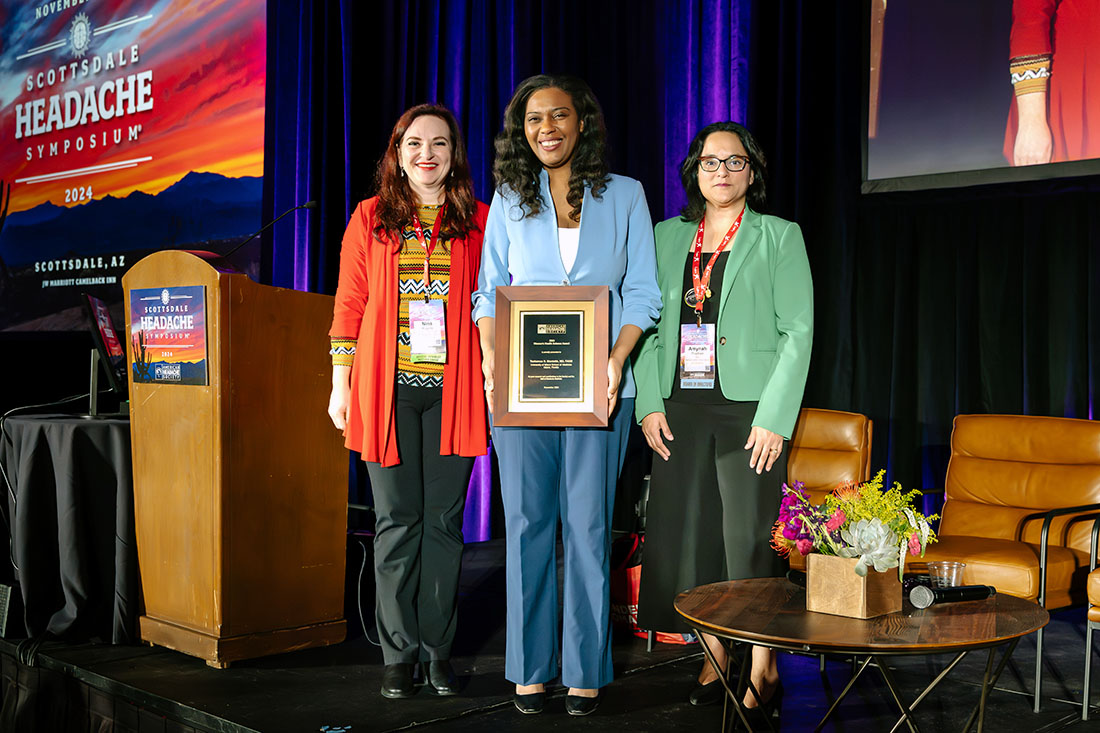[ad_1]
Teshamae Monteith, M.D., was honored in recognition of her outstanding contributions to both headache medicine and women’s health.

Migraine is the second most common neurological disorder in the United States, and is particularly debilitating for women. Despite its widespread impact, this invisible, life-altering condition is often stigmatized.
Teshamae Monteith, M.D., professor of clinical neurology and chief of the Headache Division in the Department of Neurology at the University of Miami Miller School of Medicine, has been a trailblazer in advancing the understanding and treatment of headache disorders, especially those affecting women. She recently received the Women’s Health Science Award from the American Headache Society (AHS) for her contributions to headache medicine and women’s health.
“Women are two to three times more likely to have migraine, and their migraine attacks may last longer and be more severe,” said Dr. Monteith. “Migraine is not simply head pain. It’s a chronic brain disorder that disrupts every aspect of life and has important hormonal contributions.”
The award, presented annually, recognizes researchers whose work in basic science or clinical or multidisciplinary research has made an outstanding contribution to the understanding of topics related to women’s health and headache medicine.

“I am deeply honored to receive this recognition,” said Dr. Monteith, an active AHS member for 16 years. “By improving care, advancing research and breaking the silence around migraine, we can transform the lives of those affected.”
The Women’s Health Science Award is the most recent in a string of honors for Dr. Monteith. The president of the Florida Society of Neurology visited the Island SPACE Caribbean Museum earlier this year as one of four nominees for the Honoring Exceptionally Regal Sisters (HERS) award. Florida Congresswoman Debbie Wasserman Schultz presented congressional recognition certificates to Dr. Monteith and her fellow nominees.
Headache Symposium: Advancing Migraine Care for Women
Dr. Monteith presented her impactful work at the 2024 Scottsdale Headache Symposium, which has served as a critical platform for advancing evidence-based, clinical knowledge on headache diagnosis, management and treatment.
She spoke about the relationship between migraine care and brain health, including studies from the Northern Manhattan Study in collaboration with and under the mentorship of the former chair of neurology, the late Ralph Sacco, M.D., M.S. She discussed the disease prevalence of migraine, the impact on women, clinical manifestations, progression and treatment considerations. She also highlighted research priorities to transform migraine care in women across the lifespan and ways to improve women’s health in headache medicine, including mentoring, leadership development and workforce priorities.
“Migraine-specific approaches are not only reducing the side effects of traditional treatments, but also empowering women to regain functionality and achieve a higher quality of life,” said Dr. Monteith.
We spoke with Dr. Monteith to gain deeper insight into her work.
Describe the Miller School’s neurology department.
We have the largest neurology department in the state and are known for high-quality care of patients, especially in South Florida. We perform important, state-funded research, in addition to research and other leadership activities supported by national and international agencies and organizations. As a growing headache division, my colleagues and I are proud to build on this momentum.
Tell me about your lecture series.
Now entering its third year, I organize a lecture series on women’s brain health and neurology. The series examines gender-specific factors impacting neurological disorders, focusing on conditions like migraine, stroke, epilepsy and other brain health issues that disproportionately affect women.
What are your efforts beyond clinical practice?
Beyond clinical practice, I am dedicated to advancing neurological care through education, research and leadership. I’ve contributed to over 200 podcasts, including the American Academy of Neurology’s “Neurology Podcast,” “Neurology Minute” and “Continuum” audio. As president of the Florida Society of Neurology, I am committed to supporting Florida neurologists and other practitioners, shaping health policy and raising awareness of neurological disorders through education and advocacy. I also support patient education as a member of editorial boards for the Brain and Life magazine and the American Migraine Foundation.
Describe your role as fellowship director and mentor.
As fellowship director, I am committed to producing outstanding headache specialists to meet the population demand. We are thrilled that the Miller School is committed to advancing neurology. Our headache program is one of just three in the state. The environment provides a great foundation for our highly innovative and dynamic teaching methods. Mentoring the next generation of researchers and clinicians is a big part of what we do. We need more role models and champions.
How are you involved in global health?
I have been involved in global health through my participation in global education, both foreign conferences and virtual programs. The goal is to collaborate with international colleagues to increase headache education and expand access to headache care in underserved regions, thereby tackling severe global disparities. I am also a mentor for the University of Miami International Medicine Institute, thus supporting headache education and neurology training for foreign doctors.
Describe your role in the International Headache Society.
As an associate editor of the premier international journal Cephalalgia, I contribute to a process that leads to the dissemination of high-quality science and other areas of headache medicine worldwide. As the co-chair of the membership committee, we seek ways to expand the IHS membership, across specialties, so that optimal headache care is more attainable worldwide.
How do you view the future of headache medicine?
The future of headache medicine lies in personalized medicine, with targeted treatments, fewer side effects and innovative delivery methods like injections and neuromodulation devices that directly influence brain activity. The promise of headache research is to identify new therapeutic targets, providing more effective solutions for the complex nature of migraine, across all populations throughout the lifespan.
Tags: cluster headache, Department of Neurology, Dr. Teshamae Monteith, headache medicine, migraine, neurology
2024-12-16 18:30:59
[og_img
